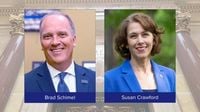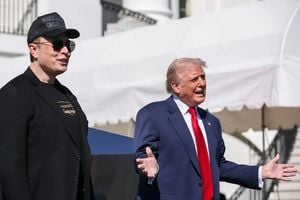In a high-stakes election that has drawn national attention, liberal candidate Susan Crawford has triumphed over Elon Musk-backed Brad Schimel in the Wisconsin Supreme Court race. This election, held on April 1, 2025, has become the most expensive judicial election in U.S. history, with over $100 million spent. Crawford secured a 10-year term, shifting the balance of power in the court, which is poised to influence critical issues like abortion rights, voting access, and redistricting in the swing state of Wisconsin.
The election highlighted the significant financial clout of both Musk and his political action committees (PACs), which poured more than $24 million into supporting Schimel. Musk's involvement, characterized by extravagant campaign tactics, has raised eyebrows and led to accusations of trying to unduly influence the election. In contrast, Crawford received backing from Democratic donor George Soros, who contributed approximately $2 million to the state Democratic Party.
Crawford's victory margin was 54.8% to Schimel's 45.2%, a clear indication of voter sentiment in this contentious race. During her victory speech, Crawford expressed disbelief at having to compete against the "richest man in the world" and emphasized the importance of justice being free from monetary influence. "Today, Wisconsinites fended off an unprecedented attack on our democracy, our fair elections, and our Supreme Court," she stated, adding that "justice does not have a price. Our courts are not for sale."
Throughout the campaign, both candidates leveraged the influence of their billionaire backers in their advertisements. Crawford's campaign portrayed her victory as a win against Musk's financial might, while Schimel's camp attempted to link her to Soros and other liberal figures. Schimel, a Waukesha County judge, conceded defeat shortly after the results were announced, acknowledging that the numbers were not going to turn around. "We will rise again. We’ll get up to fight another day. It just wasn’t our day," he told supporters.
The financial stakes in this election were unprecedented, with total spending exceeding $107 million. This figure included $58.2 million spent by Schimel and his supporters, while Crawford and her backers contributed $48.8 million. Major contributions came from not only Musk but also from influential figures like Illinois Gov. J.B. Pritzker, who donated $1.5 million to support Crawford's campaign, and billionaire Dick Uihlein, who contributed nearly $8 million to the Republican Party.
As the dust settles on this election, the implications for Wisconsin's political landscape are significant. With Crawford's victory, the court will maintain a narrow liberal majority of 4-3, a critical advantage for Democrats as they navigate upcoming cases that could reshape the state's political power dynamics. This includes potential rulings on redistricting and abortion laws, which are expected to be contentious issues in the coming years.
The Wisconsin Supreme Court has seen a shift in control over the past few years, with Crawford's win marking the fourth victory for liberals in the last five Supreme Court races. Two years ago, a liberal majority was established for the first time in 15 years, and with Crawford's addition to the bench, the court's ideological balance remains tilted towards liberalism.
Experts have noted that Musk's financial engagement in politics is now outpacing that of Soros. While Musk has contributed upwards of $290 million to Republican PACs and candidates, Soros's contributions, although significant, are dwarfed in comparison. This election has underscored the increasing influence of billionaire donors in shaping judicial outcomes and political landscapes across the United States.
In the lead-up to the election, Musk made headlines for his controversial campaign strategies, including offering $1 million checks to Wisconsin voters who signed petitions against what he referred to as "activist judges." This tactic drew criticism and raised questions about the ethics of such financial incentives in the electoral process.
As Crawford prepares to take her seat on the Wisconsin Supreme Court on August 1, 2025, she will be stepping into a role that not only influences legal decisions but also shapes the future of Wisconsin's political landscape. With critical issues at stake, her tenure will be closely watched by both supporters and opponents alike.
The Wisconsin Supreme Court race serves as a microcosm of the broader national political climate, where the influence of wealth and the battle for ideological control are increasingly intertwined. As the court gears up for upcoming challenges, the implications of this election will resonate far beyond the state lines, reflecting the ongoing struggle for power in American politics.





